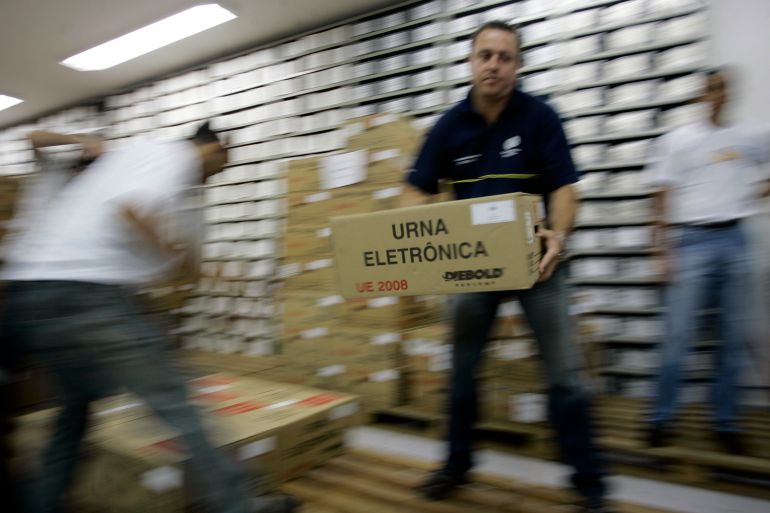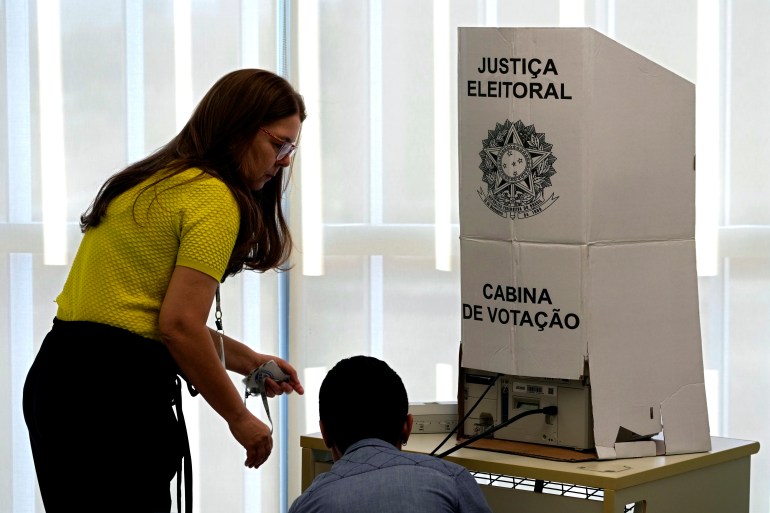Bolsonaro’s false fraud claims involve this Brazil voting system
Jair Bolsonaro says electronic voting machines in Brazil are prone to fraud, but there is no such proven record.

With Brazil’s presidential election just a month away, President Jair Bolsonaro is feeding concerns about the nation’s electronic voting system.
He has long insisted that the machines, used for a quarter-century, are prone to fraud, though he acknowledged last year that has not been proved.
Keep reading
list of 3 itemsBrazil’s never ending war on the poor
Bolsonaro, Lula go on offensive in Brazilian presidential debate
Brazil’s top electoral authority says the system has been tested rigorously and some critics of Bolsonaro say he may be laying the groundwork for an attempt to cling to power if the vote doesn’t go his way – much like former US President Donald Trump, whom Bolsonaro has said he admires.
Here’s a look at Brazil’s electronic vote system:
Why does Brazil use an electronic system?
Brazilian authorities adopted electronic voting machines to tackle long-standing fraud. In earlier elections, ballot boxes had arrived at voting stations already stuffed with votes. Others were stolen and individual votes were routinely falsified, according to Brazil’s electoral authority.
Electronic machines were first used in 1996 and the first nationwide, electronic-only vote took place four years later. Today, results from more than 150 million eligible voters are presented mere hours after polls close. And no significant fraud has ever been detected.

How common is electronic voting elsewhere?
More than two dozen countries use some form of an electronic system for national elections, according to the International Institute for Democracy and Electoral Assistance. But 80 percent do not, and voters in most advanced democracies cast their ballots on paper.
Brazil’s system does not produce a paper record of individual votes, though Bolsonaro has advocated for that.
How is Brazil’s voting system audited?
The electoral authority says voting machines are checked for reliability before, during and after balloting. Votes recorded by each machine can be cross-checked with the overall tallies after the vote.
Election officials have acknowledged that hacking is always a risk, but say no one has ever managed to alter the machines’ source code or election results. They say risks are further minimised because the machines are not connected to the internet and information is sent only through internal systems, segments of which shut down if alterations are detected.
For this year’s elections, over a dozen institutions — including police, the military, prosecutors and universities — accepted the electoral court’s invitation to audit the machines. During a three-day hackathon in May, some 20 hired experts sought to penetrate the system. None succeeded.

When did fraud allegations begin?
In 1993, then-lawmaker Bolsonaro complained to members of the military that the paper voting system was rigged, and spoke in favour of digitalisation. Once electronic voting was implemented, however, he became one of its fiercest critics. In 2015, he proposed a constitutional amendment to introduce printed records of votes that would allow manual recounts. That passed Congress, but arguments it was too costly and could violate the right to a secret ballot led the Supreme Court to block it.
What evidence does Bolsonaro cite?
Bolsonaro won the presidency in a 2018 runoff, and later vociferously claimed fraud had denied him an outright victory in the first round.
For months, he promised proof was coming, and his administration tasked the Federal Police with scouring the prior 25 years for evidence. Finally, last year he acknowledged, “There is no way to prove the elections were or weren’t fraudulent. There are indications.” Following that admission, lawmakers rejected a new Bolsonaro-backed bill once again seeking to adopt printed records.
Still, Bolsonaro has continued to attack the machines’ reliability. In July, he called dozens of diplomats to the presidential residence to present his claims. He focused heavily on the existence of a police investigation into a 2018 incident in which a hacker broke into the electoral authority’s internal system. The authority, which asked for the police investigation, said the hacker never accessed any voting machines nor their source code and so could not alter the data or compromise results.
Allegations that the system is unreliable have spread across social media and messaging apps — often in groups backing the president. That is similar to the attacks questioning the security of voting equipment in the US since Trump lost the 2020 presidential election. Republicans in some places have sought to ditch all voting and tabulating machines in favour of paper ballots and hand-counting.